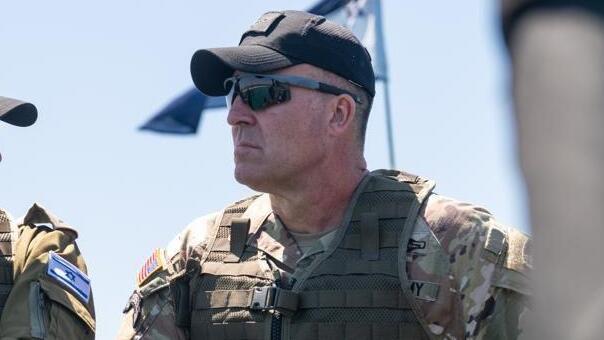Getting your Trinity Audio player ready...
U.S. Central Command (CENTCOM) Commander Gen. Michael Kurilla, seen as one of Israel’s staunchest allies in the American defense establishment, has reportedly become the leading voice within the U.S. military advocating for a joint strike with Israel on Iran’s nuclear facilities, the New York Times reported on Saturday.
Since Hamas’ October 7 attack, Kurilla has played a central role in reinforcing U.S.-Israel military coordination, including initiating the deployment of U.S. aircraft carriers to the region. Now, with only a few months left in his post, Kurilla is leading a faction in Washington pushing for coordinated military action against Iran — a stance opposed by others in the Trump administration who favor diplomatic engagement.
According to the report, internal U.S. discussions over recent months were divided into two camps: one led by Kurilla in favor of a joint military strike, and another advocating diplomacy to curb Iran’s nuclear ambitions. Ultimately, President Donald Trump sided with the latter, shelving Israel’s operational plans.
Prime Minister Benjamin Netanyahu reportedly traveled to Washington in a last-ditch effort to convince Trump to greenlight the operation, but failed. Israeli officials told the Times that the IDF had developed a plan involving a combined air and commando strike but were not operationally ready before October. As a result, Israel pivoted toward planning a solo aerial assault, requiring U.S. support.
Kurilla and National Security Adviser Mike Waltz evaluated how the U.S. could assist, with the Pentagon deploying military assets to the region, including two aircraft carriers, Patriot and THAAD batteries and B-2 bombers — a move widely interpreted as preparation for a possible Israeli strike.
Israeli defense analysts say the window for a successful attack on Iran’s nuclear program is rapidly closing. According to Israeli and U.S. intelligence sources, the combination of Israel’s recent military gains in Gaza, domestic turmoil in Iran and the current geopolitical alignment offers a rare opportunity for an effective strike. That window could narrow dramatically once Kurilla steps down, as his successor’s stance remains unclear.
3 View gallery


Prime Minister Benjamin Netanyahu and US President Donald Trump
(Photo: Kevin Dietsch/GettyImages)
Kurilla’s relationship with Israel runs deep. His first visit to the country was as a young officer in his 20s, and he has since visited dozens of times — more than 15 visits in the past two years alone. His leadership at CENTCOM has emphasized a practical, tech-driven approach to regional defense coordination, avoiding formal alliances like NATO in favor of behind-the-scenes integration.
Israeli military officials dubbed this system “Kurilla’s umbrella,” noting that U.S. radar systems in the UAE and Qatar can now aid Israeli defense. According to foreign reports, that umbrella also included quiet cooperation from Saudi Arabia and Jordan during Iran’s failed missile and drone barrage in April 2023.
Get the Ynetnews app on your smartphone: Google Play: https://bit.ly/4eJ37pE | Apple App Store: https://bit.ly/3ZL7iNv
Kurilla is also known for his meticulous attention to detail. “He knows the type of every munition launched at Israel that night, and where each interceptor was positioned,” an Israeli official told Ynet last year. “Wake him in the middle of the night, and he’d ace a pop quiz better than some of our own officers.”
Despite his operational edge, Kurilla is widely praised in Jerusalem and Washington alike for his collaborative and non-patronizing leadership style, engaging directly with mid-level Israeli generals and seeking their input.
Under his tenure, CENTCOM underwent a significant technological transformation. Kurilla appointed civilian CTO Skyler Moore to a senior role, upgraded cyber infrastructure and launched a dedicated tech division — all while maintaining day-to-day command over operations against the Houthis, Iraqi militias and Iran.
As Kurilla prepares to end his command, questions remain about whether his successor will maintain the same aggressive posture toward Iran — and whether the opportunity window for Israeli military action will close with his departure.



